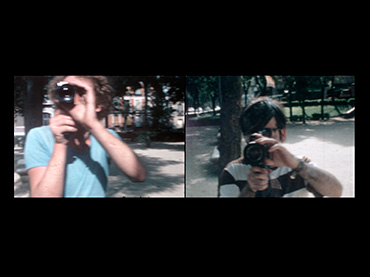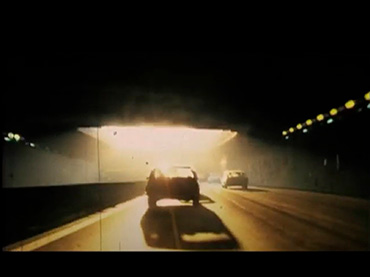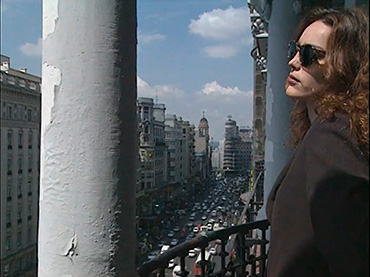-
Saturday, 27 May 2023 Sabatini Building, Auditorium
Session 1
TicketsJoseph Morder and Dominique Delcourt. Niños, niñas (Malasaña) (Boys, Girls [Malasaña])
France, 1978, colour, without sound, Super-8 transferred to DA, 36´
— With a presentation by Joseph Morder and Adrián García. Live music from Javi ÁlvarezIn this multi-channel, two-screen film we see images shot single-mindedly by film-makers Joseph Morder and Dominique Delcourt, as if they were seeing the world for the first time. Each image takes on new meaning as it meets the adjacent one, a play of entrances and exits, of clues, that make the film a temporary discrepancy between our gaze and images. On one side, the era and place in which it is set: Spain 1978, for an intended, target generation; for another — younger — starting point. On the other, the narration of a trip to Madrid: an account of pages torn out of a logbook, notes and sketches of the spaces and bodies that inhabit a city. Beyond everything, testimony to a friendship that is reaffirmed in the joint desire to film. The screening also features live music by artist Javi Álvarez, put together expressly for this work.

-
Sunday, 28 May 2023 Sabatini Building, Auditorium
Session 2
TicketsJoseph Morder. L’Été madrilène (The Madrid Summer)
France, 1978, colour, original version in French with live commentary from the director, Super-8, 90´
— With a presentation by Joseph Morder and screening by Jorge Suárez-QuiñonesThis episode, the first of seven that make up Joseph Morder’s film diary, records the film-maker’s first trip to Madrid and his return to France, with his friend Dominique Delcourt. Morder’s own voice-over — live in this screening — guides the viewer in his discoveries and flashes of light, filmed with the delicacy of Super-8 and the vibrant colours of Kodachrome. In Morder’s words: “[…] before the trip I decided to introduce a voice-over into the diary which would mix with the live sound of the sequences. The first images record the road trip to the film festival of La Rochelle with Gerard Courant. Afterwards, I travelled to Madrid with my friend Dominique. The amazing thing was that the new form of the diary coincided with this experience and had a profound effect on both of us. This experience has become hugely important in my life. Being in other places, I always recall the Madrid I filmed in 1978. And so, after that trip, the diary began to take on a non-fictional form but by chapters, each one with a title of fiction”.

-
Monday, 29 May 2023 Sabatini Building, Auditorium
Session 3
TicketsJoseph Morder. La Gran Vía de Rita Jones (The Gran Vía of Rita Jones)
France, 1996, colour, original version in French with Spanish subtitles, DA, 47´
— With a presentation by Joseph MorderA film shot solely on Madrid’s Gran Vía in a heartfelt homage to the history, architecture and memory of the city through this street. The voice-over of a woman leads a narrative in which the avenue becomes an enthralling space, and with the protagonist and her grandmother, Rita Jones, we cross the twentieth century and its tragedies. Joseph Morder films demonstrations, faces in the crowd, posters, buildings, statues and facades once more. Every edit and camera movement is precise, combining with music and voice-over to the rhythm of the story.

Joseph Morder. Diaries of Madrid
![Joseph Morder, Niños, niñas (Malasaña) (Boys, Girls [Malasaña]), film, 1978](https://recursos.museoreinasofia.es/styles/large_landscape/public/Actividades/morder_snippet.jpg.webp)
Held on 27, 28, 29 May 2023
Joseph Morder (Trinidad and Tobago, 1949) is a film-maker and diarist whose Super-8 films are a monument to experimentation and film as a way of life. This programme, comprising three, single-screening sessions, unveils three of his films on the city of Madrid and its people, neighbourhoods, history and lives: Niños, niñas (Malasaña) (Boys, Girls [Malasaña], 1978), L’Été madrilène (The Madrid Summer, 1978) and La Gran Vía de Rita Jones (The Gran Vía of Rita Jones, 1996). The film-maker will be in attendance at all three screenings.
Morder has always occupied an unorthodox space. With ties to avant-garde film cooperatives from 1970s France — Paris Films Coop, Collectif Jeune Cinéma — and film-makers such as Marguerite Duras, Alain Cavalier, Teo Hernández, Marcel Hanoun and Dominique Noguez, he has never belonged to any one group, participating instead to show his films and watch those made by other artists from a peripheral place.
From a young age he dreamed of making films of a similar ilk to much-admired film-makers like Douglas Sirk, Vincente Minnelli and Fritz Lang; namely, in the classical Hollywood tradition. At the tender age of eighteen, and newly arrived in Paris from Ecuador, Morder filmed his first Super-8 films: life stories and fragments made with friends and relatives. With a solid command of narration and editing from the outset, he was never concerned with avant-garde experimentation or the perfect technical mastery of his medium.
A tireless film archivist, traveller, writer and hardened cinephile with a love of Spanishness in all its forms, Morder has endeavoured to love film as someone loves life. In approaching his filmography, twelve hundred films strong, to date, we encounter a tenacious figure who is able to make a diary and film in each of his trips around the world.
Curator
Adrián García Prado
Organised by
Museo Reina Sofía
Más actividades
![Tracey Rose, The Black Sun Black Star and Moon [La luna estrella negro y negro sol], 2014.](https://recursos.museoreinasofia.es/styles/small_landscape/public/Obra/AD07091_2.jpg.webp)
On Black Study: Towards a Black Poethics of Contamination
Monday 27, Tuesday 28 and Wednesday 29 of April, 2026 – 16:00 h
The seminar On Black Study: Towards a Black Poethics of Contamination proposes Black Study as a critical and methodological practice that has emerged in and against racial capitalism, colonial modernity and institutional capture. Framed through what the invited researcher and practitioner Ishy Pryce-Parchment terms a Black poethics of contamination, the seminar considers what it might mean to think Blackness (and therefore Black Study) as contagious, diffuse and spreadable matter. To do so, it enacts a constellation of diasporic methodologies and black aesthetic practices that harbor “contamination” -ideas that travel through texts, geographies, bodies and histories- as a method and as a condition.
If Blackness enters Western modernity from the position of the Middle Passage and its afterlives, it also names a condition from which alternative modes of being, knowing and relating are continually forged. From within this errant boundarylessness, Black creative-intellectual practice unfolds as what might be called a history of touches: transmissions, residues and socialities that unsettle the fantasy of pure or self-contained knowledge.
Situated within Black radical aesthetics, Black feminist theory and diasporic poetics, the seminar traces a genealogy of Black Study not as an object of analysis but as methodological propositions that continue to shape contemporary aesthetic and political life. Against mastery as the horizon of study, the group shifts attention from what we know to how we know. It foregrounds creative Black methodological practices—fahima ife’s anindex (via Fred Moten), Katherine McKittrick’s expansive use of the footnote, citation as relational and loving labour, the aesthetics of Black miscellanea, and Christina Sharpe’s practices of annotation—as procedures that disorganise dominant regimes of knowledge. In this sense, Black Study is approached not as a discrete academic field but as a feel for knowing and knowledge: a constellation of insurgent practices—reading, gathering, listening, annotating, refusing, world-making—that operate both within and beyond the university.
The study sessions propose to experiment with form in order to embrace how ‘black people have always used interdisciplinary methodologies to explain, explore, and story the world.’ Through engagements with thinkers and practitioners such as Katherine McKittrick, C.L.R. James, Sylvia Wynter, Christina Sharpe, Fred Moten, Tina Campt, Hilton Als, John Akomfrah, fahima ife and Dionne Brand, we ask: What might it mean to study together, incompletely and without recourse to individuation? How might aesthetic practice function as a poethical intervention in the ongoing work of what Sylvia Wynter calls the practice of doing humanness?

Intergenerationality
Thursday, 9 April 2026 – 5:30pm
This series is organised by equipoMotor, a group of teenagers, young people and older people who have participated in the Museo Reina Sofía’s previous community education projects, and is structured around four themed blocks that pivot on the monstrous.
The third session gazes at film as a place from which to dismantle the idea of one sole history and one sole time. From a decolonial and queer perspective, it explores films which break the straight line of past-present-future, which mix memories, slow progress and leave space for rhythms which customarily make no room for official accounts. Here the images open cracks through which bodies, voices and affects appear, disrupting archive and questioning who narrates, and from where and for whom. The proposal is at once simple and ambitious: use film to imagine other modes of remembering, belonging and projecting futures we have not yet been able to live.

Remedios Zafra
Thursday March 19, 2026 - 19:00 h
The José Luis Brea Chair, dedicated to reflecting on the image and the epistemology of visuality in contemporary culture, opens its program with an inaugural lecture by essayist and thinker Remedios Zafra.
“That the contemporary antifeminist upsurge is constructed as an anti-intellectual drive is no coincidence; the two feed into one another. To advance a reactionary discourse that defends inequality, it is necessary to challenge gender studies and gender-equality policies, but also to devalue the very foundations of knowledge in which these have been most intensely developed over recent decades—while also undermining their institutional support: universities, art and research centers, and academic culture.
Feminism has been deeply linked to the affirmation of the most committed humanist thought. Periods of enlightenment and moments of transition toward more just social forms—sustained by education—have been when feminist demands have emerged most strongly. Awareness and achievements in equality increase when education plays a leading social role; thus, devaluing intellectual work also contributes to harming feminism, and vice versa, insofar as the bond between knowledge and feminism is not only conceptual and historical, but also intimate and political.
Today, antifeminism is used globally as the symbolic adhesive of far-right movements, in parallel with the devaluation of forms of knowledge emerging from the university and from science—mistreated by hoaxes and disinformation on social networks and through the spectacularization of life mediated by screens. These are consequences bound up with the primacy of a scopic value that for some time has been denigrating thought and positioning what is most seen as what is most valuable within the normalized mediation of technology. This inertia coexists with techno-libertarian proclamations that reactivate a patriarchy that uses the resentment of many men as a seductive and cohesive force to preserve and inflame privileges in the new world as techno-scenario.
This lecture will address this epochal context, delving into the synchronicity of these upsurges through an additional parallel between forms of patriarchal domination and techno-labor domination. A parallel in which feminism and intellectual work are both being harmed, while also sending signals that in both lie emancipatory responses to today’s reactionary turns and the neutralization of critique. This consonance would also speak to how the perverse patriarchal basis that turns women into sustainers of their own subordination finds its equivalent in the encouraged self-exploitation of cultural workers; in the legitimation of affective capital and symbolic capital as sufficient forms of payment; in the blurring of boundaries between life and work and in domestic isolation; or in the pressure to please and comply as an extended patriarchal form—today linked to the feigned enthusiasm of precarious workers, but also to technological adulation. In response to possible resistance and intellectual action, patriarchy has associated feminists with a future foretold as unhappy for them, equating “thought and consciousness” with unhappiness—where these have in fact been (and continue to be) levers of autonomy and emancipation.”
— Remedios Zafra

ARCO2045. The Future, for Now
Saturday 7, March 2026 - 9:30pm
The future, its unstable and subjective nature, and its possible scenarios are the conceptual focus of ARCOmadrid 2026. A vision of the future linked to recent memory, a flash of insight into a double-edged sword. This year's edition, as in the previous two, will once again hold its closing party at the Reina Sofia Museum. This time, the star of the show is Carles Congost (Olot, Girona, 1970), one of the artists featured in the new presentation of the Collections recently inaugurated on the 4th floor of the Sabatini Building.
Carles Congost, with his ironic and timeless gaze, is responsible for setting the tone for this imperfect future, with a DJ session accompanied by some of his works in the Cloister on the first floor of the Sabatini Building of the Museo on the night of Saturday 7 March.

27th Contemporary Art Conservation Conference
Wednesday, 4, and Thursday, 5 March 2026
The 27th Contemporary Art Conservation Conference, organised by the Museo Reina Sofía’s Department of Conservation and Restoration, with the sponsorship of the Mapfre Foundation, is held on 4 and 5 March 2026. This international encounter sets out to share and debate experience and research, open new channels of study and reflect on conservation and the professional practice of restorers.
This edition will be held with in-person and online attendance formats, occurring simultaneously, via twenty-minute interventions followed by a five-minute Q&A.